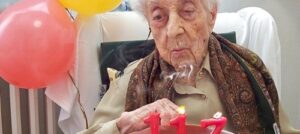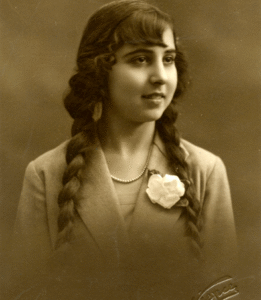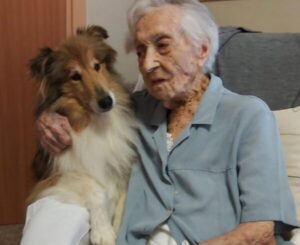Scientists Examine DNA of 117-Year-Old Woman — and Discover a Surprising Clue About Longevity

For centuries, humanity has been fascinated by the question of how to live longer, healthier, and more meaningful lives. In recent years, researchers have begun to uncover pieces of that puzzle — from the role of genetics and environment to the surprising influence of gut health and emotional well-being. But few stories have captivated scientists as profoundly as that of Maria Branyas Morera, a woman whose remarkable 117 years of life may hold clues to the secret of extreme longevity.
A Life That Spanned Eras and Empires
Maria Branyas Morera’s life reads like an encyclopedia of modern history. Born on March 4, 1907, in San Francisco, California, she came into the world at a time when horse-drawn carriages still clattered along cobblestone streets and the idea of commercial flight was little more than a dream. She would go on to live through two world wars, the Great Depression, the moon landing, the digital revolution, and the presidencies of 21 U.S. leaders.
At the age of eight, her family relocated from the United States to Catalonia, Spain — a move that would shape the rest of her life. The voyage, however, was marked by tragedy: her father, a journalist, died from tuberculosis during the journey. Maria’s early loss and resilience would come to define her outlook on life — one of perseverance, gratitude, and quiet strength.
In Spain, Maria built a life rooted in simplicity and purpose. She married a physician, raised three children, and lived to see 11 grandchildren and 13 great-grandchildren. By the time she passed away in August 2024, she had witnessed more than a century of social, cultural, and technological transformation.

A Gift to Science: Her Final Wish
In the later years of her life, Maria did something few centenarians have ever done: she volunteered her DNA for scientific study. Curious about what allowed her to remain both healthy and mentally sharp past the age of 110, she requested that her genetic material be analyzed after her death. Her wish was simple — to help science unlock the biological mechanisms that make longevity possible.
Her request was accepted by a group of Spanish researchers from the University of Barcelona and the Josep Carreras Leukaemia Research Institute. Led by renowned epigeneticist Dr. Manel Esteller, the team set out to explore not just why Maria lived so long, but why she remained remarkably healthy throughout her advanced years — a rare combination even among the world’s oldest people.
As Dr. Esteller told The Times,
“Most people become increasingly sick as they age, but Maria was an exception. We wanted to understand why. For the first time, we’ve been able to separate being old from being ill.”
The team examined everything — her genetic makeup, metabolic health, immune profile, and even her daily habits — in hopes of understanding how she defied what most scientists consider biological limits.

A Body Decades Younger Than Its Age
The research produced results that stunned scientists. On a biological level, Maria appeared to be 10 to 15 years younger than her actual age. Her bloodwork showed exceptionally low levels of LDL cholesterol and triglycerides — the fats typically associated with heart disease — while her HDL (“good”) cholesterol levels were impressively high. Her blood pressure and inflammation markers were those of someone much younger, suggesting her body maintained a surprising degree of physiological youthfulness well past her 100th birthday.
Even her cellular health was remarkable. The scientists analyzed her telomeres — the protective caps at the ends of chromosomes that typically shorten as humans age. In most people, short telomeres are associated with disease and increased mortality. Yet Maria’s telomeres appeared to behave differently. According to the study, her cells showed signs of adaptive stabilization, meaning her telomeres may have protected her body from the uncontrolled cell growth that leads to cancer — a phenomenon almost never seen at such an advanced age.
The Role of Yogurt — and the Science of Simplicity
While Maria’s genes undoubtedly played a role, researchers were equally intrigued by her lifestyle and diet — which they described as “consistently healthy, yet strikingly simple.”
She avoided alcohol and tobacco her entire life, stayed physically active well into her hundreds, and cherished her daily routines. Her mornings began with a smoothie of eight different grains — a mix of fiber, minerals, and plant-based nutrients that supported digestion and blood sugar balance.
But perhaps the most surprising discovery was her lifelong love for yogurt, particularly La Fageda, a locally made Spanish probiotic yogurt. The researchers noted that Maria consumed yogurt almost daily, often citing it as her favorite food. The probiotic cultures found in La Fageda are rich in anti-inflammatory bacteria, which have been linked to improved gut health, lower systemic inflammation, and better immune regulation — all factors closely tied to healthy aging.
Though scientists caution against calling yogurt a “miracle food,” they acknowledged that it may have played a role in maintaining her microbiome health, protecting her against age-related decline. “A balanced gut ecosystem affects everything — from the immune system to mental health,” one of the study’s co-authors, Dr. Aleix Noguera-Castells, explained. “Maria’s case gives us a real-world example of how a stable, probiotic-rich diet can support longevity.”
The Emotional Blueprint for a Long Life
Beyond biology, Maria’s psychological and social habits stood out as equally vital. She often described her philosophy of life as one centered on peace, order, and connection. On her social media accounts — yes, she maintained an active online presence even in her centenarian years — she shared wisdom that reflected her calm yet determined spirit.
Her advice for longevity was disarmingly simple:
“Order, tranquillity, good connection with family and friends, contact with nature, emotional stability, no worries, no regrets, lots of positivity, and staying away from toxic people.”
Her family said she maintained a regular sleep routine, limited stress, and valued laughter and conversation above all else. Even in her final years at a nursing home in Catalonia, she was known for participating in activities, engaging in conversation, and keeping her mind sharp through reading and writing.
Maria also had strong views on how society treats the elderly. During the COVID-19 pandemic, she became a public advocate for senior dignity, remarking:
“This pandemic revealed that older people are the forgotten ones. They fought their whole lives for the quality of life we enjoy today. They deserved better.”
She famously survived COVID-19 herself at the age of 113, becoming the oldest recorded survivor of the virus at the time.
What Science Learned from Maria Branyas Morera
The research team’s findings were published in late 2024, drawing international attention. Their report concluded that longevity is not purely genetic, nor purely environmental — it’s the balance between the two.
Dr. Esteller summarized their results:
“Roughly half of what determines extreme longevity comes from our genes, and the other half comes from the choices we make every day.”
Maria’s case challenges a long-standing assumption in medicine: that reaching an advanced age inevitably comes with frailty and disease. “She proved that being very old and being unhealthy are not the same thing,” Esteller added.
The researchers believe Maria’s unique epigenetic patterns — the way her lifestyle influenced her gene expression — may hold the key to developing future therapies that mimic the biological advantages of “good aging.” Scientists are already exploring whether certain drugs or nutritional interventions could replicate some of the protective effects observed in her DNA.
The Legacy of a Life Well Lived
Maria Branyas Morera passed away peacefully on August 19, 2024, at the age of 117 years and 168 days, leaving behind not only a large and loving family but also a scientific legacy that may help extend human life for generations to come.
She became the world’s oldest person after the passing of Sister André in 2023 and held the title for over a year. Her life serves as a testament to the power of optimism, moderation, and connection — values often overlooked in modern conversations about health and aging.
Her story reminds us that longevity isn’t about escaping time but about learning to live gracefully within it. Through her DNA and daily habits, Maria offered scientists and humanity a rare gift: a biological and philosophical roadmap to living not just longer, but better.
In the words of Dr. Esteller,
“Maria showed us that extreme age does not have to mean decline. It can mean vitality, wisdom, and the proof that balance — between genes, environment, and the spirit — is the real secret to life.”